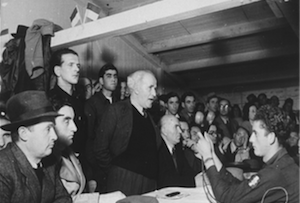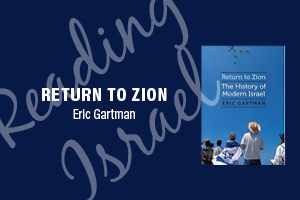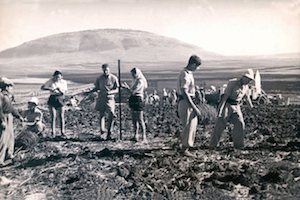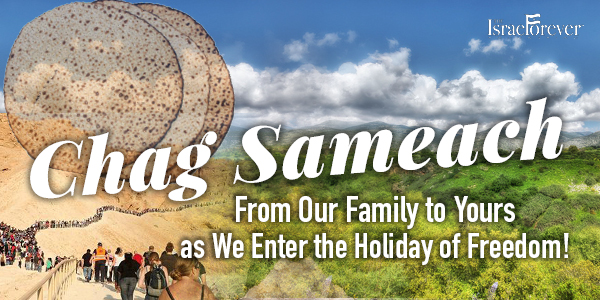The Battle Lines Were Drawn. The Jews Would Not Surrender.
By Eric Gartman
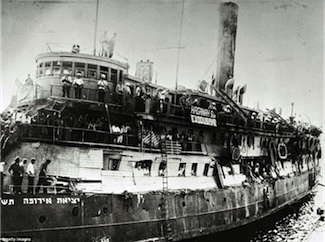
The crowded illegal immigration ship Exodus, carrying Jewish refugees from war-torn Europe enters Haifa port on July 18, 1947 after three hours of combat with the British navy. A gaping whole is clearly visible in the ship’s side. An eyewitness wrote: “The ship looked like a matchbox that had been splintered by a nutcracker. In the torn, square hole, as big as an open blitzed barn, we could see a muddle of beddings, possessions, plumbing, broken pipes, overflowing toilets, half-naked men, women looking for children; railings were ripped off; the lifesaving rafts were dangling at crazy angles.” The plight of the ship created sympathy for the Jews.
On July 18, 1947 a rickety old river steamer from the United States chugged toward the port of Haifa. Although it was designed to hold 400 people, no fewer than 4,500 concentration camp survivors were crammed together in the most unsightly and unsanitary manner imaginable. Renaming their ship the Exodus 1947, they had departed France a few days before. As it neared Haifa, a British armada of six destroyers and one cruiser bore down on the Exodus. The British captain hailed the refugee ship: “I must warn you that illegal entry of you passengers into Palestine will not be allowed; and your ship will be arrested if you try to do so. We do not want to hurt anyone, but if you resist force will be used…I repeat force will be used if our sailors are attacked. Your leaders and all sensible passengers must stop the hot heads from futile resistance.”
“On the deck of this boat, the Exodus, are more than 4,000 people, men, women, and children, whose only crime is that they were born Jews,” the refugees defiantly retorted. “We have nothing against your sailors and officers, but unfortunately they have been chosen to implement a policy to which we shall never acquiesce, for we shall never recognize a law forbidding Jews to enter their country. We are not interested in the shedding of blood, but you must understand that we shall not go to any concentration camp of our own free will, even if it happens to be a British one.”
The battle lines were drawn. The Jews would not surrender; the British would not allow them entry into Palestine. The British captain gave the orders. The armada machine-gunned the Exodus. Still the ship would not surrender. Two destroyers rammed the fragile ship from opposite sides, smashing into its upper deck. When this too failed to deter the refugee steamer, British sailors stormed the ship. They were assailed with stream jets, smoke bombs, fireworks, and whatever the refugees could get their hands on. The refugees coated the decks with oil, making them slippery for the boarding teams. ‘I tried to get on board three times but there was too much opposition in the shape of big Yids, a British seaman told his captain. “I was forced to draw my revolver and fired eleven warning shots. One of the last shots, however, I used to stop a lad of 17 or 18 from collecting my scalp with a meat axe. He got it in the stomach.
The boarding party fanned out on the old tub and clubbed the captain to death, killed two others, and wounded many more. Still, the ship refused to surrender. Only when the continued ramming of the ship threatened to sink it did the Exodus give finally give in after three hours of fighting. Riddled with holes and listing badly, the ship was towed into Haifa harbor. At the dock, a crowd of several thousand Jews looked on and cheered their brethren while the passengers sang Hatikvah. As reporters and photographers looked on, American journalist Ruth Gruber described the horrific state of the Exodus:
The ship looked like a matchbox that had been splintered by a nutcracker. In the torn, square hole, as big as an open blitzed barn, we could see a muddle of beddings, possessions, plumbing, broken pipes, overflowing toilets, half-naked men, women looking for children; railings were ripped off; the lifesaving rafts were dangling at crazy angles…
A child came off, with large frightened eyes. He carried a potato sack with his belongings; a blanket was strapped across his back. A man and a child came down, hand in hand. The child broke away and ran back up the gangway, looking for his mother. He was sobbing with fright. The soldiers gently pulled him down the gangway again. No one was allowed to return to the ship…
The people trickled down the gangways in little groups and milled about on the dock like frightened animals. They looked weary and shattered, mourning their dead and hundreds wounded. Surrounded by troops to prevent their escaping into Haifa, they made their first step on the dreamed-of soil. They breathed the air deeply and tiredly… On the pier, the British took off every bandage and examined every wound to make sure that only the serious cases stayed. Some of the wounded screamed with pain as their head dressings were untied and then tied up again. A military ambulance waited on the dock. When the army doctor nodded his head, a patient was placed on one of the ambulance gurneys. To be sent to Haifa’s hospitals, they had to be more to the dead than to the living…
The refugees looked up at Mount Carmel and seemed to say to themselves, This land is mine. Soon it will be mine forever. They’re only taking us to Cyprus. We’ll be there only a year or two. Then we’ll come back with visas. We’ll come back forever…
By this time the heat had become suffocating. The babies, who had been incredibly quiet, began to cry. Men looked dazed and ready to collapse as red-bereted soldiers shoved them along the last mile. Members of families, separated for the search pens, were taken to different transports. They were reassured that they would be reunited the next day in Cyprus.
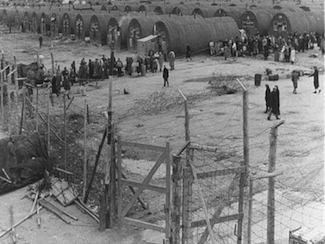
British detention camp on Cyprus. “You had to smell Cyprus to believe it. You had to smell the latrines for twenty thousand people to believe it - and you didn’t believe it. You had to smell the sweat of men and women as they cooked the food over open stoves and the sweat poured into their pots and pans; you had to smell the garbage which piled up waiting for the trucks didn’t come to believe it - and you didn’t believe it.” Ruth Gruber, journalist.
But the British government had no intention of sending the refugees to Cyprus. His majesty’s government wanted to make an example to discourage further immigration attempts. They placed the refugees on prison ships and sent them back to their port of origin in France. The British insisted the French forcibly disembark the passengers. The French government, sensitive to the plight of the survivors of Hitler's Final Solution, adamantly refused. The refugees refused to disembark, stating “We will go ashore in Europe only as dead men.” In the suffocating mid-summer heat a contagion of rashes and boils broke out among the passengers. The French government offered them medical care, but to do so meant leaving the ship. The refugees refused, insisting they would only disembark in Eretz Yisrael. After the heat wave, heavy rains rocked the ships for four days. Below deck in the prison cages, there was not enough room for the refugees to lie down. They were forced to stand upright against each other as the rain streamed against their bodies. When the storms ended, the heat returned.
The British had been convinced that the heat and storms would force the refugees to disembark the ships. Yet the Jews continued to defy them. The British then announced that those that did not leave the ships would be taken to Germany. The British were certain that the Holocaust survivors would not willingly go back to the land of their murderers. Once again, they were wrong. The refugees voted to stay on board. “The stand taken by the immigrants in their struggle has written a brilliant page in the history of the Jews’ fight for their freedom,” the Haganah extoled.
As the ships were awaiting the trip to Germany, journalist Gruber was allowed on board. She described the refugee’s plight as she was led down to the ships’ prison hold, which was essentially a large iron cage:
Squeezed between a green toilet shed and some steel plates were hundreds and hundreds of half-naked people who looked as though they had been thrown together in a dog pound. Trapped and lost, they were shouting at us in all languages, shattering each other's words. Some pressed their faces against the slanted fencing and their bodies looked broken and distorted. We watched the cage grow tighter and wilder as more people forced their way from somewhere in the bowels of the ship and pushed against the people already inside the narrow cage. The hot sun filtered through the grillwork, throwing sharp lines of light and darkness across the refugees' faces and their hot, sweaty, half-naked bodies. Women were nursing their babies. Old women and men sat weeping unashamed. There were no beds in the hold. Each man, woman, and child slept on a brown army blanket folded neatly on the slimy floor. The blanket was each person’s living space, his dining room, his bedroom and his study. Sometimes three or four people lay on a single blanket. Each man’s space was bounded only by the dimensions of his body.
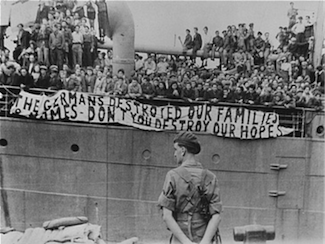
A refugee ship caught by the British. Their banner reads: The Germans destroyed our families – don’t destroy our hopes.” It is estimated that 70,000 Jews arrived in Palestine prior to 1948 under the Aliyah Bet (illegal immigration) program. Another 50,000 were rounded up by the British and placed in detention camps.
Nonetheless, when a French journalist asked if the refugees wanted to get off the ship, the reply came back: “We will come down willingly only in Palestine. Here we will come down as corpses.”
The ships set sail for Germany. The refugees described the trip there as the most interminable part of their entire ordeal: “We got two meals a day,” one man recalled. “For breakfast it was salty tea and we each got a package of British C-ration biscuits from New Zealand, and inch and a half by an inch and a half, ten in a package. When you broke them open to eat them, there were maggots in them. The evening meal was potato soup with the C-ration biscuits soaking in the soup, and for protein, the maggots were swimming around in it. When you’re hungry, you eat it, maggots and all.” When the ships arrived in Hamburg Germany, British soldiers awaited them on the docks, as did members of the media. The British demanded the passengers disembark. Once again, they refused.
Gruber recorded the ensuing chaos: “Inside the holds, the people joined hands and danced the hora, singing passionately. Hundreds of troops were rushed aboard. The soldiers ran down the steps to the holds and with clubs and hoses forced the refugees against the walls. Bucket-brigade fashion, they passed the people up the slippery stairs, across the deck, and down gangway to the wharf. Some were beaten with batons, others were kicked, pulled by the hair, and rolled down like felled trees. One of the refugees, dragged down the gangplank, shrieked, “They shall not keep us from our homeland.” The Holocaust survivors were then placed into displaced person camps in the very land of their people's murderers.
The saga of the Exodus was finally over. It had lasted two months and shocked the world. But it had brought the plight of the Jewish refugees to the forefront of the world’s agenda. And their sacrifices paid off as a short time later the United Nations voted to create the State of Israel. On May 14, 1948, the modern Exodus finally ended after two thousand years.
BACK TO PART 1 »

Born in Israel to American parents, historian Eric Gartman never lost his fascination for the Jewish homeland. He is the author of Return to Zion: The History of Modern Israel, (2015), a critically-acclaimed narrative of the birth and survival of the Jewish State.
Recommended:
YOUR ISRAEL CONNECTION FOR PASSOVER
Bring Israel into your Passover Seder today!
About the Author


